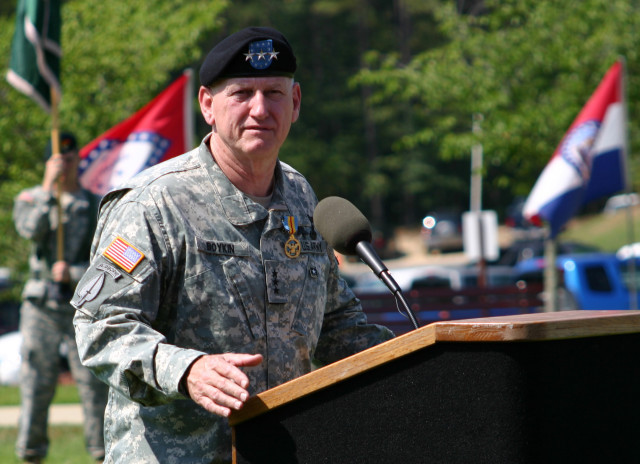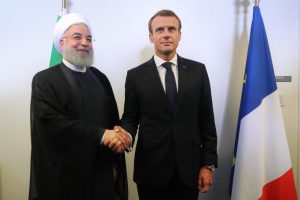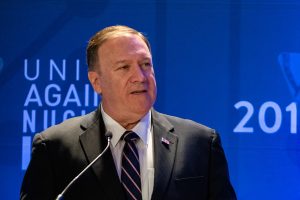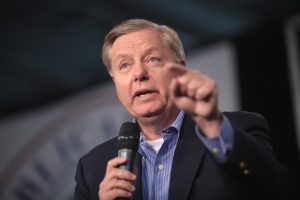by Ali Gharib and Grace Cason
When something big happens in the foreign policy world—especially a political issue that requires a vote in Congress—advocates try to shore up their positions with what are called, in public relations terms, “validators.” On issues of national security, of course, the military validator is of particular importance. So, as was bound to happen with the fight over the Iran nuclear deal, both sides have turned to friendly former military personnel, particularly flag officers, for their opinions on the deal.
Earlier this month, dozens of top ranking former military officials—generals and admirals—voiced their support for a deal. In a letter, the officers called the deal “the most effective means currently available to prevent Iran from obtaining nuclear weapons.” Now, we have its counterpart, which hit the presses yesterday. “The agreement will enable Iran to become far more dangerous, render the Mideast still more unstable and introduce new threats to American interests as well as our allies,” says the new letter, organized as an explicit response, according to the Washington Post, by Retired Adm. Leon “Bud” Edney.
The anti-deal military letter, however, has something the pro-deal military letter didn’t: the list of nearly 200 signatories includes more than a few unsavory characters. In addition to including two former military officials involved in the Iran-Contra affair—Vice Adm. John Poindexter and retired Maj. Gen. Richard Secord—several signatures came from former military officials aligned with or associated with hardline neoconservative Washington groups. Perhaps most strikingly, several of the signatories associated themselves with—or, in one case, are themselves from among—America’s leading Islamophobes. As Matt Duss tweeted, opponents of a deal seem “unable to assemble groups of ex-military critics that don’t include anti-Muslim conspiracy theorists.”
Duss’s tweet was prompted by the inclusion of, among others, retired Lt. Gen. William G. “Jerry” Boykin, a former Undersecretary of Defense in the George W. Bush administration and now a vice president at the religious right organization the Family Research Council. The anti-bigotry group the Southern Poverty Law Center describes Boykin on its site as “a Christian far-right activist and anti-Muslim propagandist.” The SPLC lists, among other quotes, Boykin remarking that “Islam is evil.”
Boykin is also a member of the Center for Security Policy (CSP) “military committee” and this year signed a CSP letter praising Louisiana Governor Bobby Jindal for describing Islam as a “terrorist movement.” CSP, which is headed by the neoconservative hawk and arch-Islamophobe Frank Gaffney, has its fingerprints all over the new letter. Edney, who initiated the anti-Iran-deal letter, is also a member of Gaffney’s “military committee.”
In addition to Boykin and Edney, six other signatories of the anti-deal letter—Adm. James A. Lyons, Jr., Maj. Gen. Paul E. Vallely, Gen. J.B. Davis, Lt. Gen. Thomas McInerney, Vice Adm. Robert Monroe and Adm. Leighton ‘Snuffy’ Smith—also serve on Gaffney’s “military committee.” Gaffney, of course, praised the new letter in a blogpost this week.
This does not mean, of course, that all the letter’s signatories hail from the Islamophobic fringes, but it is an alarmingly large contingent of them. What’s more, some of the characters are affiliated with other right-wing groups, including dodgy Iranian opposition groups. One hardline neoconservative policy organization that has tied to numerous signatories to the anti-deal letter is the Jewish Institute for National Security Affairs (JINSA), which focuses on pressing for hawkish policies and building closer relationships between the Israeli and American militaries.
Letter organizer Bud Edney, for one, sits on JINSA’s board of advisors—one of eight of the letter’s signatories who sits on that board, in addition to two former JINSA advisory board members that signed. In all, 34 of those former military officers who signed the anti-deal letter have been associated with JINSA—either serving on its board, signing one of its letters or, as was most commonly the case, traveling to Israel on the group’s dime to “meet the top echelon of the Israeli military and political leadership.’
These trips constitute one of JINSA’s major activities. The group claims to have taken nearly 400 former senior military officers on the junket over the years. Of the letter’s signatories, 31 traveled to Israel with the organization.
This is not the first time former military officials opposing the Iran deal have been dogged by dodgy connections and views. At The Huffington Post a few weeks back, Sam Stein noted that a memo from the influential pro-Israel group AIPAC, which is vociferously lobbying against the deal, touted opposition to the nuclear accord from Adm. Lyons, who promulgates the conspiracy theory that the Obama administration has been infiltrated and taken over by the Muslim Brotherhood. Lyons, a columnist for the far-right, Moony-owned Washington Times, deserves a special category of his own: he accused then-incoming CIA director John Brennan of being a secret Muslim and Saudi double agent.
The AIPAC memo also promoted the views of Gen. Hugh Shelton, an outspoken, longtime supporter of the controversial Iranian opposition group the Mojahedin-e Khalq, often known as the MEK. (For more on the MEK and its history, see the feature Eli and I wrote last winter for The Intercept.) Shelton isn’t the only MEK supporter rolled out by AIPAC. As Eli wrote in these pages, the spin-off AIPAC created to run ads against the Iran deal promoted the views of retired Lt. Gen. David A. Deptula. As Eli went on to note, Deptula has also signed a pair of letters organized by Frank Gaffney and CSP, the one praising Jindal and another letter this summer praising Tom Cotton for taking a super hawkish line on Iran.
Another signatory to the new anti-deal letter, Thomas McInerny (who is also on Gaffney’s “military committee”), has also praised the MEK. McInerny has said the that the MEK, which has led conventional military and terrorist attacks against Iran, was a “credible overt political-military counterforce to the Iranian regime.” He urged that the MEK be used to carry out “proactive actions” against Iran. Yet another signatory, Paul Vallely (also, as noted, affiliated with CSP), served alongside McInerney as a member of the Iran Policy Committee, a largely defunct Washington outfit whose main purpose was promoting the MEK.
It’s stunning that opponents of the Iran deal—even purportedly mainstream groups like AIPAC—cannot bring together a cohort of former military officials against the Iran deal that doesn’t include at least a few anti-Muslim bigots, conspiracy theorists, MEK promoters, or, at the very least, hardline neoconservative hawks. If anything, the background of these “validators” against a deal should make people think twice about opposing it.
Grace Cason is a graduate student at Johns Hopkins University in Washington, DC, in foreign policy and national security. She received her undergraduate degree from Ohio State University in International Studies.
Photo: William G. Boykin






Is there even one ‘lefty’ represented among these ‘protestors’?
These are not military men; they are boys with uniforms and medals serving their paymasters.
ali – who pays you?
I guess Christianity has its own DAESH (ISIS).
rg: “who pays you?”
Certainly not AIPAC.